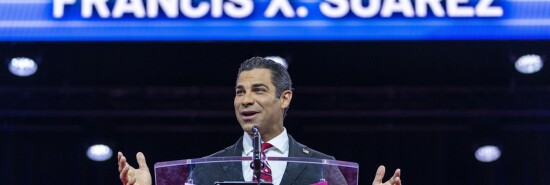
The growing Republican crowd
Byron York
THE GROWING REPUBLICAN CROWD. Miami Mayor Francis Suarez announced Thursday that he is running for the Republican nomination for president. Suarez released a video of himself in athletic clothes running around Miami as dramatic music swelled behind him. “When I was elected, the city was broke and broken,” he says in the video. “But we came together, and I won my mayoral election with over 80% of the vote.” (Critics quickly pointed out that Miami has a city manager government in which the mayor has relatively little power.)
Suarez touts his accomplishments in education, the economy, and bringing innovation to Miami, a city with a population of 449,514. Now, he says he can do that for the United States, population 333,287,557. “America’s so-called leaders confuse being loud with actually leading,” he says. “All Washington wants to do is fight with each other instead of fighting for the people that put them in office.”
Ask yourself: Could you have named the mayor of Miami before Thursday? Even some who know Suarez wonder what is going on. “I don’t think he has any business running for president,” said Rep. Carlos Gimenez (R-FL), an ally of former President Donald Trump. “He does not really run even the city of Miami. So why in the world does he think that he can run the most powerful nation on Earth?”
Subscribe today to the Washington Examiner magazine that will keep you up to date with what’s going on in Washington. SUBSCRIBE NOW: Just $1.00 an issue!
And before that question, another: Why does Suarez think he can win the Republican nomination? That is the threshold question for all the super-long-shot candidates: Why?
In today’s Republican race, it’s a question not just for Suarez, but for Doug Burgum, for Larry Elder, and for Asa Hutchinson — all the candidates currently below 1% support in the RealClearPolitics average of polls. What is their scenario, their plan, for winning the Republican nomination?
At a recent Republican event in Iowa, Sen. Joni Ernst’s “Roast & Ride,” eight candidates spoke. Gov. Ron DeSantis (R-FL) topped the bill, the premier attraction given that Trump, by far the leader in the GOP race, declined to appear. After that, the candidates were former Vice President Mike Pence, former South Carolina Gov. Nikki Haley, Sen. Tim Scott (R-SC), Vivek Ramaswamy, Hutchinson, and Elder.
But wait — that’s just seven. The eighth candidate was a man named Perry Johnson. Never heard of him? He is a 75-year-old businessman who has written several books on quality control and international standards. He wanted to run for governor of Michigan in 2022 but was disqualified because he could not meet the Republican Party’s requirement for 15,000 valid signatures in support of his candidacy. Now, for some reason, he says he is running for president.
The remarkable thing is that Johnson was given a speaking slot at the same event that featured DeSantis, Pence, Haley, Scott, and others. Perhaps that is explainable at this early stage in the race when the barriers to entry are lowest. But with Johnson, one could say with great assurance that the barrier was even lower than that. And now, yet another candidate, Suarez, who at least has the advantage of having been elected to something, is in the race as well.
Why do they do it? Perhaps some are delusional and believe they can be president. But others see that running for president can improve their position in the world. They’ll be in a better place after having run than before. Look, for example, at Pete Buttigieg, who ran for president at 37 years old as the former mayor of South Bend, Indiana, population 103,110. It’s hard to imagine a candidate with fewer credentials for president, yet Buttigieg did well and is now, as a result of that run, the secretary of the Department of Transportation. Other former candidates have ended up with bigger jobs or media contracts. There can be rewards for running and losing.
For the party, the question is whether the number of candidates really matters at this stage in the race. Some are sure to run out of money and drop out. Others will be winnowed out by progressively tougher Republican Party standards of entry into party debates. That will happen before any votes are cast in February 2024. After that, the race will have mostly viable candidates.
It’s a perfectly normal process. At the moment, though, some anti-Trump Republicans are pulling their hair out, worried that a big field will split the anti-Trump vote and allow Trump to win primaries with just a plurality of the vote and wind up with the Republican nomination again.
Maybe that will happen, although at the moment, even with a multicandidate field, Trump has an actual majority of support in the RealClearPolitics average of polls — 52.1% to DeSantis’s 21%. No one else is above 5%. Trump’s current lead is enough to win outright.
That is just the situation at this moment. Things will undoubtedly change. But if in the end Trump wins the nomination, he wins the nomination. And if it is impossible for Trump to win the general election, as some believe, then Republicans will lose. That’s how the system works. The GOP field is crowded and includes a number of people who shouldn’t be there. But voters will decide things soon enough.
For a deeper dive into many of the topics covered in the Daily Memo, please listen to my podcast, The Byron York Show — available on the Ricochet Audio Network and everywhere else podcasts can be found. You can use this link to subscribe.
